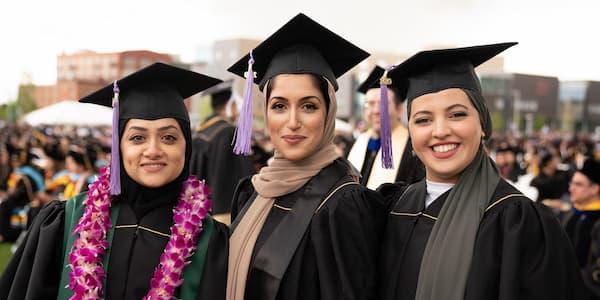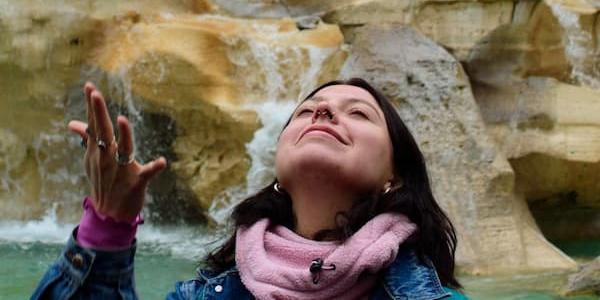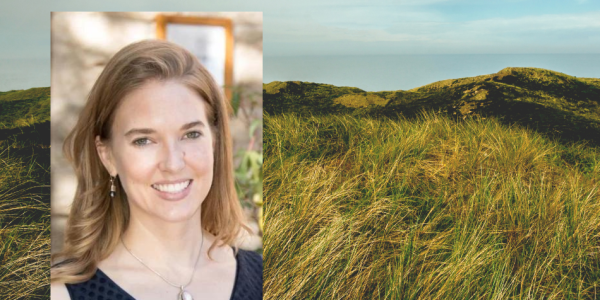Anthropology: the holistic study of humankind
Interested? Request more information
Credit hours: 120
Full-time, part-time
BA in Anthropology available on-campus or fully online
Start terms: fall, spring, summer
Anthropology is the study of humankind in all of our complexity—past and present, home or abroad, in our cultural behaviors and in our genes. In an era of escalating global connections and conflicts, no other discipline prepares you better to be a citizen of the world than Anthropology.
Anthropology comprises the entire human experience, including societies, cultures, and behaviors. It considers human beings as biological and social entities and seeks to explain both diversities and commonalities of peoples and cultures. Through research and analysis, you can understand the elements that bind people together, including human origins, ideologies, language, health, art, faith, social justice, and technology.
You will gain a variety of skills and practical research methods which will be applied in laboratory and field studies to investigate complex and multifaceted topics. You can find anthropologists in every corner of the globe and in every type of industry—whether at Google, Netflix, museums, nonprofits, zoos, the National Park Service, or the Centers for Disease Control. With a focus on understanding human behavior, cultural difference, and human nature—past and present--Anthropology gives you the tools to make a difference in the world.
Program Features
Opportunities Abound
Anthropology provides opportunities to apply your knowledge right here in the heart of Denver. Our classes offer first-hand experience with the human condition up-close. For example, you might:
- Explore labor conditions in Colorado’s cannabis industry
- Design a survey to support legislation expanding health care access to immigrants
- Talk with neighborhood activists about how gentrification affects them
- Interview Indigenous leaders about their opinions about the legalization of psychedelics
- Take a field trip to a zoo to learn about our primate relatives
- Participate in a field school to study the footprints of humans’ earliest-known ancestor
- Advocate for equity and social justice through analysis of wholistic data sources
Community, Engaged Faculty, and Mentorship
More than just a major, Anthropology offers a unique way of viewing the world and a community of like-minded spirits. Plan your future and explore the mysteries of human behaviors and of human nature.
Our faculty deeply cares about their students and give you undivided attention and guidance. They help you plan your future and explore the mysteries of human behaviors and of human nature with you.
Want to know how your degree can help you get a job? Our Alumni Mentorship Program pairs you with a graduate in a field of your interest.
Want to put your skills in Anthropology to use in field trips with other like-minded students? Our Anthropology and Experimental Prehistory Club will give you a chance to visit a mammoth graveyard or throw atlatls.
Careers
What can you do with an Anthropology degree?
A bachelor’s degree in anthropology can prepare you for a wide range of careers. The study of Anthropology comprises the entire human experience, including societies, cultures, and behaviors. Through research and analysis, you can understand the elements that bind people together, including human origins, ideologies, language, health, art, faith, social justice, and technology.
Anthropology is a diverse discipline with creative career opportunities in academia, business, government, and nonprofits. Because we promote cultural understanding and provide a historical perspective on humankind, our graduates are highly sought after in a variety of fields. The hands-on curriculum will equip you with high demand skills including fieldwork, participant observation, archival research, and quantitative analysis.
Our graduates go on to work in:
- nonprofit organizations
- community-based groups
- businesses and international affairs
- government agencies
- public administration and public affairs
- environmental design and city planning
- health care and medical professions
- education and research settings
- museums
- zoos
Our graduates have become:
- Archaeologist
- Cultural Resource Manager
- Community Manager
- User Experience (UX) Researcher
- Computational Anthropologist
- Digital Curator
- Program Curator
- Research Scientist
- Museum Educator
- Archivist
- Health Scientist
- Forensic Anthropologist
- Social Scientist
- Policy Analyst
While not explicitly necessary, our anthropology undergraduates often stay at CU Denver or go on to another university to pursue a graduate degree to advance their knowledge and remain competitive in the job market.
Curriculum
You have the opportunity to explore the human and pre-human past through archaeology, the history of how humans became what we are through biological anthropology, and the human present through cultural anthropology.
Majoring in Anthropology: 35 hours
(Effective fall '26)
Learn about completing your B.A. in Anthropology fully online
Our introductory courses acquaint you with the basic history, methods, and perspectives of Anthropology, whereas our upper division and elective courses feature in-depth, topical, and theoretical investigations into specific dimensions of the human experience.
Many of our courses allow you to be involved with community-engaged, hands-on, applied work in your own backyard. Featured topics include:
- Cultural Diversity in the Modern World—gather oral histories from family and community members and present those stories in a compelling way
- Immigrant Health—conduct fieldwork projects with immigrant and refugee-serving agencies
- Zooarchaeology—through hands-on lab work identifying and analyzing animal skeletons recovered from archaeological sites, learn about the biological and cultural evolution of human behavior
- History of Human Environmental Impacts—assess the claim that environmental and ecological factors have played a key role in human societies through a longitudinal and cross-cultural lens
You have the opportunity to pursue an internship related to your field of study to further apply your learning.
Specializations
Explore the courses that interest you the most and we do not require you to choose a specialization. However, we do offer three distinct specializations to help guide your educational journey:
Archaeology
Understand the past through historical and pre-historic materials, architectural features, landscapes and remains.
Biological/Physical Anthropology
Human and non-human primate evolution, ecology, behavior, and biocultural variation.
Cultural/Medical Anthropology
The social patterns and processes within and across cultures, and the factors the influence people’s health and well-being.
CU Denver Core: 34-40 Hours
You’ll be educated in:
- English and mathematics
- International and cultural diversity perspectives
- Arts and humanities
- Behavioral, physical, and social sciences
College of Liberal Arts and Science Core—15 Hours
These courses give you a better understanding of the issues and skills you need to succeed. Topics include:
- Logic, Language, and Scientific Reasoning
- Psychology
- Writing for the Sciences
- Public Health
Minor in Anthropology
Non-Anthropology majors can add a minor in Anthropology to their degree by completing at least 18 hours of specified coursework. You will need to see your CLAS advisor to declare this minor.
Topics include:
- Evolution
- Adaptation
- Archaeology
- Biological Anthropology
- Cultural Diversity
- World Prehistory
Take Three of the Following (9-11 credit hours):
- ANTH 1302, Introduction to Archaeology (four credit hours)
- ANTH 1303, Introduction to Biological Anthropology (four credit hours)
- ANTH 2102, Culture and the Human Experience (three credit hours)
- ANTH 3101, Foundations of Cultural Anthropology (three credit hours)
- ANTH 3301, World Prehistory (three credit hours)
- ANTH 3512, Issues in Human Evolution (three credit hours)
Elective Courses: 7-9 credit hours needed
Certificates
Gain additional skills and make yourself more marketable by adding a certificate. Many students choose to add:
Ethnographic Methods Certificate
Ethnography illuminates people’s experiences and opinions and helps unravel why they behave the way they do. Our Undergraduate Certificate in Ethnographic Methods provides students with the toolkits to design, conduct, and analyze ethnographic research, an essential skill in professional fields like public health, program evaluation, urban planning and user design and also in multiple other social scientific disciplines.
Archaeological Methods Certificate
(Pending approval for Fall 2026, but will apply retroactively for courses taken beforehand)
By earning the Certificate in Archaeological Methods, you can demonstrate skills in your choice of material culture analysis, human or animal osteological analysis, field survey, statistical research, museum, or GIS research. These skills are in demand in all types of archaeological careers, from government to cultural resource management to academia to museums.
Double Majors
You may be interested in a double major. Common combinations include:
Learning outcomes
Demonstrate familiarity with the history of anthropological thoughts, theories, and current major schools of thought within the discipline.
Demonstrate familiarity with human diversity, particularly people and cultures in at least one geographic region of the world over time (ELO of intercultural knowledge and competence, civic knowledge and engagement on a local and global level).
Apply anthropological research methods in collecting, organizing, and analyzing data in at least one subfield of anthropology (ELO of inquiry and analysis, critical thinking, quantitative literacy, information literacy, problem solving, ethical reasoning and action, foundations and skills for lifelong learning and integrative and applied learning).
Demonstrate competence in reading and critical evaluation of information from the perspective of behavioral science and from the perspectives of anthropological theory and ethics, thus fulfilling requirements for the well-rounded liberal arts education (ELO of critical thinking, reading, quantitative literacy, information literacy, problem solving, ethnical reasoning and action, foundations and skills for lifelong learning, and integrative and applied learning).
Demonstrate their ability to effectively communicate their thoughts orally and in writing (ELO of written communication and oral communication).
Students will demonstrate an understanding of Anthropological ethics. This includes being able to identify and articulate the purpose, use and relevancy of a study, and being well versed in issues of informed consent, ownership of data/images, rights of descendent and/or local populations, rights and access to archaeological/paleoanthropological sites, and the protection of vulnerable populations.
Tuition
The cost of tuition for the Bachelor of Arts (BA) in Anthropology is different for in-state and out-of-state students. See the link for the current table of rates.
Residents of western states may qualify for reduced tuition rates. The Western Undergraduate Exchange (WUE) program requires students to maintain current residency in WICHE state until degree completion.
Scholarships
Each year, CU Denver undergraduate students are awarded over $30 million in scholarships from institutional, local, state, and national sources. Learn more, and apply here.
Paul Minnis and Patricia Gilman Award
Each year, the Anthropology Department can provide an award of roughly $1000 each to three deserving students, thanks to the generous support of alumnus Paul Minnis and his wife, Patricia Gilman. These awards can go to an undergraduate or graduate student, and may be used for tuition, research, or travel.
Other opportunities
The department of Anthropology and other departments have paid positions (both in the work-study program and outside of it) which may include jobs as graders, teaching assistants, and learning assistants.
Admission Requirements
If you are an incoming freshman to CU Denver (in-state, out-of-state, and international applicants), you can apply through either the Common Application or the Milo Application. Transfer students will need to submit the Milo Application.
Incoming first-year students
CU Denver requires that students complete the Colorado Higher Education Admission Requirements (HEAR). You will not have to meet all Minimum Academic Preparation Standards (MAPS) for admission, but you will need to complete CU Denver coursework by graduation.
Transfer Students
We have strong connections with other four-year and community colleges. If you have completed more than 24 credits of transferable coursework, you will be evaluated for admission on the basis of your college GPA without regard to your high school performance. If you have fewer than 24 credits, you will be evaluated based on both your high school and college GPAs. For more information and to plan your transfer, see transfer admissions in the admissions office.
If you are in your first or second semester at one of the participating Colorado community colleges and plan to transfer to CU Denver after earning your associate degree, CU Denver Bridge to Bachelors might be a great program for you. To qualify, you must meet the criteria including meeting regularly with your assigned CU transfer advisor while you are attending community college.
International Students
You will need to begin your application through the Office of International Affairs. They will help you manage your application process.
Application deadlines
Spring
Domestic Application: January 1
International Applications: Priority is September 15, and Final is October 15
Summer
Domestic Applications: May 15
International Applications: Priority is January 15, and Final is March 15
Fall
Domestic Applications: August 1
International Applications: Priority is March 15, and Final is May 15
Anthropology in the News
In the News
- CU Denver Anthropology Students Shine at RMBAA 2025: Real-World Research, Real Impact
- Did Homo Naledi Bury Its Dead or Not? Where Do We Stand?
- A Collaborative Approach to Migration: CU Denver Anthropology Research Drives Real-World Policy Solutions
- Rethinking the Obstetrical Dilemma: a Conversation with CU Denver Anthropologist Anna Warrener
- Anthropologists Gather in Denver for Unique Comparison of Morocco and South Africa's Human Past
- Beekman and colleagues publish on 8500 year record of changes in climate, lake levels, and settlement in western Mexico
- Christopher Beekman Publishes on the History of the Americas
- Sarah Horton Publishes on Latinx Immigrants' Access to Care in Colorado
- Breaking Stigmas: Art and Cannabis in North America - Book Launch
- Breaking Stigmas: Art and Cannabis in North America

Making Education Work for All
At CU Denver, making education work for all means breaking down barriers so every learner can succeed. Through inclusive policies, programs, and partnerships, we’re building a culture where opportunity isn’t defined by identity but by ambition and impact. Learn more at our Office of Access and Campus Engagement (ACE)

Find your people
Campus can feel like a huge place. We help you find your people by offering the experience of a more traditional, small liberal arts program—for a fraction of the cost. We offer a variety of clubs and networking opportunities.

Anthropology Showcases Cultural Variation
Through my time as an undergraduate anthropology student at CU Denver, I have embraced the words of Anthony Kwame Harrison, who said, “the discipline does not showcase diverse human lifeways to further exoticize those who live differently from us. In contrast, anthropology showcases cultural variation to illustrate the possibilities and potential for human life, and to demonstrate that the way of doing things we know best is neither normal nor necessarily right. It is just one way among a multitude of others. “Everybody does it but we all do it different”; this is culture”.
Mac Ervin, 2024
Field Interviewer




